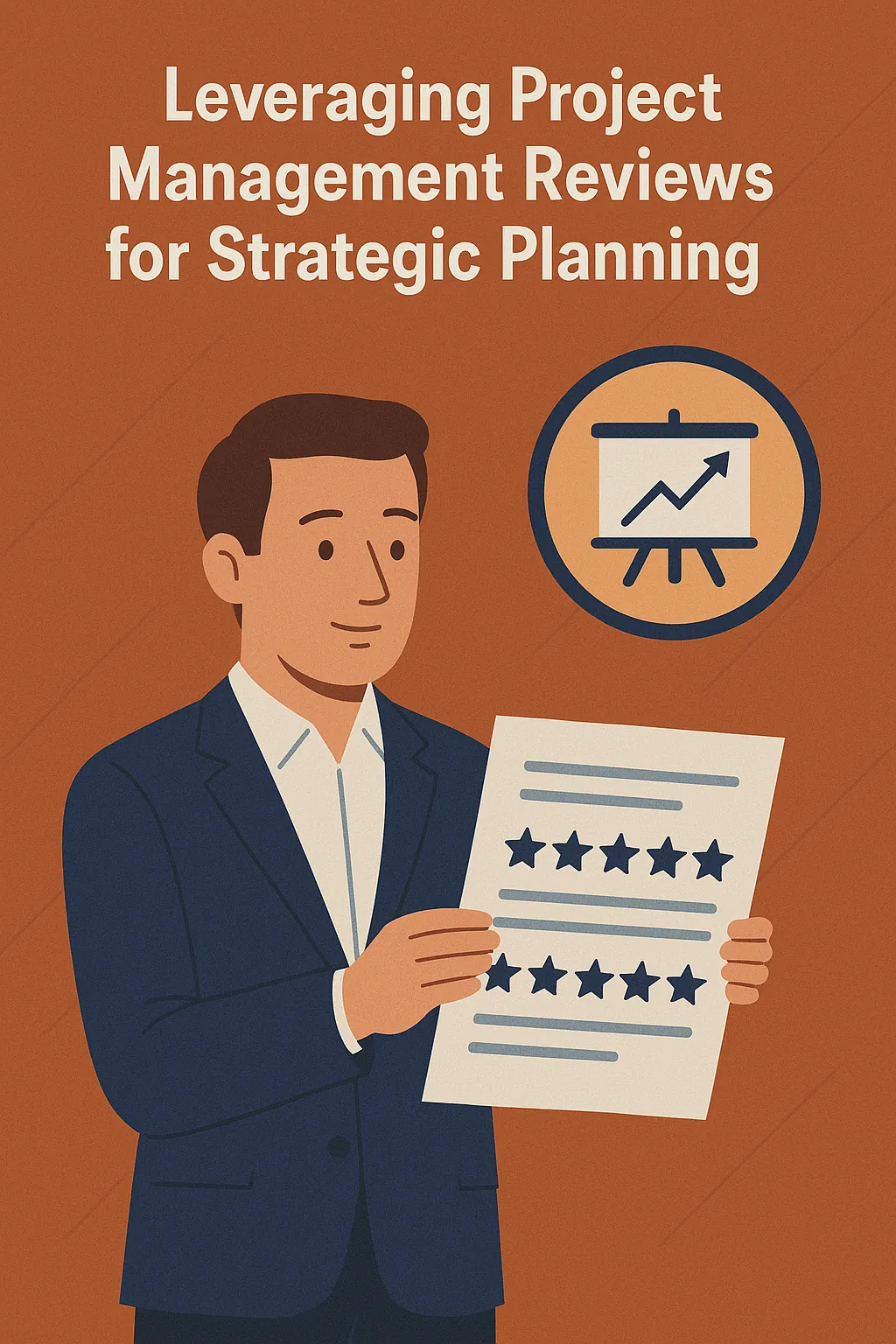Introduction to Project Management Reviews
Project management reviews are systematic evaluations conducted at various stages of a project to assess its progress, performance, and alignment with strategic objectives. These reviews serve as critical checkpoints that help organizations ensure that their projects are on track and delivering the expected value. By leveraging insights gained from these reviews, executives and senior project managers can make informed decisions that enhance project outcomes and align initiatives with broader business strategies.
Definition of Project Management Reviews
Project management reviews are formal assessments that analyze the status and performance of a project against its defined goals and objectives. They provide a structured approach to evaluate whether a project is meeting its intended outcomes, adhering to timelines, and staying within budget. These reviews are essential for identifying potential risks and issues early in the project lifecycle, allowing for timely interventions and adjustments.
Types of Project Management Reviews
There are several types of project management reviews, each serving a unique purpose:
- Post-Mortem Reviews: Conducted after project completion, these reviews analyze what went well and what did not, providing valuable lessons for future projects. They help organizations understand the effectiveness of their project management practices and identify areas for improvement.
- Phase-Gate Reviews: These are conducted at the end of each project phase to determine whether the project should proceed to the next stage. They assess the project’s alignment with strategic goals, resource allocation, and risk management, ensuring that only viable projects continue.
- Ongoing Evaluations: These reviews occur throughout the project lifecycle, allowing for continuous monitoring of progress and performance. They help project managers make real-time adjustments and ensure that the project remains aligned with strategic objectives.
Role in Enhancing Project Outcomes and Strategic Alignment
Project management reviews play a pivotal role in enhancing project outcomes by providing a framework for accountability and transparency. They enable organizations to:
- Identify and Mitigate Risks: Regular reviews help in early identification of potential risks, allowing teams to implement mitigation strategies before issues escalate.
- Ensure Strategic Alignment: By evaluating projects against organizational goals, reviews ensure that resources are allocated to initiatives that support the overall business strategy. This alignment is crucial for maximizing the return on investment in projects.
- Facilitate Continuous Improvement: Insights gained from reviews contribute to a culture of continuous improvement, where lessons learned are documented and applied to future projects, enhancing overall project management practices.
The Importance of Insights from Project Management Reviews
Conducting thorough reviews is not merely a procedural formality; it is a strategic necessity that can significantly influence business decisions. Insights gleaned from these reviews serve as a compass for executives and senior project managers, guiding them toward informed decision-making and strategic planning. Here are several key points that highlight the importance of these insights:
- Understanding Project Successes and Failures: Project management reviews provide a comprehensive analysis of what worked well and what did not. By systematically evaluating project outcomes, teams can identify the factors that contributed to success or led to setbacks. This understanding is crucial for replicating successful strategies in future projects and avoiding past mistakes, ultimately enhancing overall project performance and organizational effectiveness [1][3].
- Identifying Trends and Patterns: Regular reviews allow organizations to track performance over time, revealing trends and patterns that may not be immediately apparent. For instance, consistent delays in project timelines or recurring budget overruns can signal underlying issues that need to be addressed. By recognizing these patterns, organizations can implement proactive measures to mitigate risks and improve project execution in alignment with strategic goals [2][4].
- Linking Project Outcomes to Broader Business Objectives: Insights from project reviews can be instrumental in aligning project outcomes with the organization’s strategic objectives. By analyzing how individual projects contribute to overarching business goals, executives can make more informed decisions about resource allocation, prioritization of initiatives, and strategic direction. This alignment ensures that projects not only deliver on their specific objectives but also support the long-term vision of the organization [5][9].
Integrating Review Insights into Strategic Planning
Reviews serve as a critical tool for assessing project performance and identifying areas for improvement. When leveraged effectively, these reviews can provide valuable insights that inform strategic business decisions. This section outlines the process of incorporating insights from project management reviews into strategic planning frameworks, ensuring that organizations can align their project outcomes with overarching business goals.
Steps for Analyzing and Interpreting Review Insights
- Data Collection: Gather quantitative and qualitative data from project reviews, including performance metrics, stakeholder feedback, and lessons learned. This data should encompass various aspects of project execution, such as timelines, budgets, and resource allocation.
- Analysis: Utilize analytical tools and techniques to interpret the collected data. This may involve statistical analysis to identify trends, as well as qualitative analysis to understand stakeholder sentiments and project challenges.
- Synthesis: Combine insights from different projects to identify common themes and patterns. This synthesis helps in understanding broader organizational challenges and opportunities that may not be evident from individual project reviews.
- Reporting: Create comprehensive reports that summarize the findings from the analysis. These reports should highlight key insights, actionable recommendations, and potential implications for strategic planning.
Aligning Insights with Organizational Goals and Strategies
- Goal Alignment: Ensure that the insights derived from project reviews are aligned with the organization’s strategic goals. This involves mapping project outcomes to the broader objectives of the organization, such as market expansion, cost reduction, or innovation.
- Stakeholder Engagement: Involve key stakeholders in discussions about how review insights can inform strategic decisions. This collaborative approach fosters buy-in and ensures that diverse perspectives are considered in the planning process.
- Strategic Framework Integration: Incorporate the insights into existing strategic planning frameworks. This may involve adjusting project selection criteria, resource allocation strategies, or performance metrics to reflect the lessons learned from project reviews.
- Continuous Improvement: Establish a feedback loop where insights from project reviews are regularly revisited and integrated into strategic planning. This ensures that the organization remains agile and responsive to changing market conditions and internal capabilities.
Best Practices for Conducting Effective Project Management Reviews
Conducting project management reviews is essential for leveraging insights that can inform strategic business decisions. Here are some best practices to ensure these reviews are effective and yield valuable insights:
1. Setting Clear Objectives for Project Reviews
Establishing well-defined goals for each project review is crucial. Clear objectives help keep the review focused and aligned with the overall strategic direction of the organization. This clarity aids in productivity and decision-making, ensuring that the review process is not only systematic but also purposeful [3][4].
2. Involving Key Stakeholders and Gathering Diverse Perspectives
Inclusion is a key factor in conducting effective project reviews. By involving members from various departments and levels within the organization, you can gather a wide range of perspectives. This diversity enriches the review process, leading to more comprehensive insights and fostering a culture of collaboration. Engaging stakeholders ensures that the review reflects the interests and concerns of all parties involved, which can enhance buy-in for subsequent strategic decisions [1][5].
3. Utilizing Qualitative and Quantitative Metrics for Comprehensive Analysis
To achieve a holistic view of project performance, it is essential to utilize both qualitative and quantitative metrics. Quantitative data, such as key performance indicators (KPIs), provides measurable insights into project success, while qualitative feedback can offer context and depth to the numbers. Regular post-launch evaluations can help track progress and refine strategies based on these insights, ensuring that the organization remains agile and responsive to changing conditions [8][9].
By implementing these best practices, executives and senior project managers can conduct project management reviews that not only assess past performance but also inform future strategic planning, ultimately driving business growth and success.
Challenges and Solutions in Leveraging Review Insights
Reviews serve as a critical tool for assessing performance and guiding future strategic decisions. However, executives and senior project managers often encounter several challenges when attempting to leverage insights from these reviews effectively. Below are some common obstacles and potential solutions to enhance the utility of project management reviews in strategic planning.
Identifying Biases in Review Processes
- Challenge: Biases can significantly distort the outcomes of project reviews, leading to skewed insights that may not accurately reflect project performance. Common biases include confirmation bias, where reviewers favor information that supports their preconceived notions, and groupthink, which stifles dissenting opinions.
- Solution: To mitigate biases, organizations should implement structured review processes that encourage diverse perspectives. This can be achieved by involving cross-functional teams in the review process and utilizing anonymous feedback mechanisms to ensure that all voices are heard. Additionally, training reviewers to recognize and counteract their biases can foster a more objective evaluation environment [1][6].
Overcoming Resistance to Change Based on Insights
- Challenge: Even when valuable insights are derived from project reviews, there can be significant resistance to implementing changes. This resistance often stems from fear of the unknown, a lack of trust in the data, or a reluctance to alter established practices.
- Solution: To address this challenge, it is essential to communicate the benefits of change clearly and demonstrate how insights from reviews can lead to improved outcomes. Engaging stakeholders early in the process and involving them in the decision-making can also help build trust and reduce resistance. Providing training and support during the transition can further ease the implementation of new strategies based on review insights [2][3].
Establishing a Culture of Continuous Improvement and Learning
- Challenge: Many organizations struggle to foster a culture that prioritizes continuous improvement and learning from past projects. This can result in repeated mistakes and missed opportunities for growth.
- Solution: To cultivate such a culture, leadership must model the behaviors they wish to see, emphasizing the importance of learning from both successes and failures. Regularly scheduled review sessions that focus on lessons learned, rather than merely performance metrics, can encourage a mindset of growth. Additionally, recognizing and rewarding teams that actively engage in reflective practices can reinforce the value of continuous improvement [4][5].
By addressing these challenges, executives and senior project managers can more effectively leverage insights from project management reviews to inform strategic business decisions, ultimately leading to enhanced project outcomes and organizational success.
Real-World Examples of Strategic Decisions Influenced by Project Management Reviews
Project management reviews serve as a critical tool for organizations to assess their project performance and align their strategies with business objectives. By analyzing insights gained from these reviews, companies can make informed strategic decisions that enhance their overall effectiveness. Below are two compelling case studies that illustrate how project management reviews have influenced strategic planning in real-world scenarios.
Case 1: Improved Project Selection Based on Past Review Insights
A leading technology firm faced challenges in selecting projects that aligned with its long-term strategic goals. By implementing a structured project management review process, the company began to analyze past project outcomes and the factors that contributed to their success or failure.
- Findings: The reviews revealed patterns in project selection criteria that were previously overlooked, such as the importance of market demand and technological feasibility.
- Strategic Decision: Armed with these insights, the firm refined its project selection process to prioritize initiatives that demonstrated a clear alignment with market trends and customer needs.
- Outcome: As a result, the company not only improved its project success rate but also enhanced its competitive advantage in the marketplace by focusing on projects that delivered tangible business value. This case exemplifies how leveraging insights from project reviews can lead to more strategic project selection, ultimately driving better business outcomes [1][4].
Case 2: Adjusted Resource Allocation Strategy Following a Review
In another instance, a multinational manufacturing organization conducted a comprehensive review of its ongoing projects. The review process highlighted inefficiencies in resource allocation, particularly in how resources were distributed across various projects.
- Findings: The review identified that certain projects were over-resourced while others, which had higher potential returns, were under-resourced.
- Strategic Decision: Based on these insights, the organization reallocated resources to ensure that high-priority projects received the necessary support while reducing resources for less critical initiatives.
- Outcome: This strategic shift not only optimized resource utilization but also led to improved project delivery times and increased overall productivity. The organization was able to respond more effectively to market demands and enhance its operational efficiency [2][9].
Lessons Learned
From these examples, several key lessons can be drawn that are applicable across various industries:
- Data-Driven Decision Making: Regular project reviews provide valuable data that can inform strategic decisions, ensuring that organizations remain agile and responsive to changing market conditions [5][8].
- Alignment with Business Goals: Insights from project reviews can help ensure that project selection and resource allocation are closely aligned with the organization’s strategic objectives, leading to better overall performance [3][4].
- Continuous Improvement: Establishing a culture of learning from past projects fosters an environment of continuous improvement, where organizations can adapt and refine their strategies based on real-world experiences [6][9].
By integrating insights from project management reviews into strategic planning, executives and senior project managers can make more informed decisions that drive success and foster a culture of excellence within their organizations.
Conclusion: The Strategic Value of Project Management Reviews
Conducting regular reviews is not merely a procedural formality; it is a strategic necessity that can significantly influence business outcomes. Here are the key takeaways regarding the benefits of leveraging insights from project management reviews:
- Enhanced Decision-Making: Project management reviews provide critical insights that can inform strategic business decisions. By analyzing past project performances, executives can identify trends, successes, and areas for improvement, which can guide future initiatives and resource allocation [1][3].
- Risk Management: Regular reviews help in identifying potential risks early in the project lifecycle. This proactive approach allows organizations to mitigate risks before they escalate, ensuring smoother project execution and alignment with strategic goals [3][4].
- Improved Communication and Collaboration: Engaging in project reviews fosters a culture of open communication and collaboration among team members and stakeholders. This engagement not only enhances team dynamics but also ensures that everyone is aligned with the strategic objectives of the organization [3][10].
- Continuous Improvement: By systematically reviewing projects, organizations can establish a feedback loop that promotes continuous improvement. Lessons learned from past projects can be documented and applied to future endeavors, leading to more efficient processes and better outcomes [3][5].
Given these benefits, it is crucial for executives and senior project managers to prioritize project management reviews as an integral part of their strategic planning process. By doing so, they can ensure that their organizations remain agile and responsive to changing market conditions and internal dynamics.
Find out more about Shaun Stoltz https://www.shaunstoltz.com/about/.
This post was written by an AI and reviewed/edited by a human.



